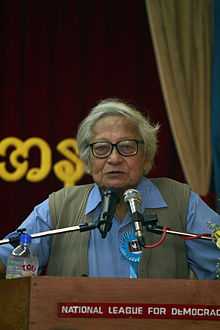Win Tin
| Win Tin | |
|---|---|
 | |
| Born |
12 March 1930 Kyopinkauk, Pegu Division, British Burma |
| Nationality | Burmese |
| Other names | Maung Wan Zin (မောင်ဝန်ဇင်း), Paw Thit (ပေါ်သစ်), Pyay Soe (ပြည်စိုး), Ponnya (ပုည), Win Swe (ဝင်းဆွေ), Thutethi (သုတေသီ), A Single Editor (အယ်ဒီတာ တဦး၊) |
| Alma mater | Rangoon University |
| Occupation | Journalist and Politician |
Political party | National League for Democracy |
| Parents |
U Pu Daw Mar |
Win Tin (Burmese: ဝင်းတင်, [wɪ́ɴ tɪ̀ɴ], born March 12, 1929) is a politician and former political prisoner in Burma. He attended Myoma High School in Yangon. Arrested in July 1989 because of his senior position in the National League for Democracy (NLD) and for his writings, he spent 19 years in prison. He received a Bachelor of Arts degree in English literature, modern history and political science at the Rangoon University in 1953.
Win Tin was serving a 20 year sentence on charges including "anti-government propaganda." One of the reasons for his detention is his attempt to inform the United Nations of ongoing human rights violations in Burmese prisons. At 81 years of age, he is in a poor state of health, exacerbated by his treatment in prison, which has included torture, inadequate access to medical treatment, being held in a cell designed for military dogs, without bedding, and being deprived of food and water for long periods of time.[1]
Since the start of 2006 he had not been able to receive visits from the International Committee of the Red Cross (ICRC).
In 2001, Win Tin was awarded the UNESCO/Guillermo Cano World Press Freedom Prize for his efforts to defend and promote and right to freedom of expression. That year, he was also awarded the World Association of Newspapers' Golden Pen of Freedom Award.
He was freed on 23 September 2008, after serving 19 years imprisonment;.[2]
After his release from prison Win Tin made efforts to reorganise the NLD. He relaunched the weekly meetings of the party's Central Executive Committee which had been irregularly held since 2003. He also resumed a regular roundtable called "Youth and Future" which Aung San Suu Kyi has participated in the past. Win Tin visited family members of political prisoners to offer moral support.[3]
References
- ↑ "Myanmar: Time for justice as human rights defender spends 75th birthday in prison". Amnesty International. Retrieved 2008-10-19.
- ↑ "Burmese democracy veteran freed". BBC News Online. 2008-09-23. Retrieved 2008-10-19.
- ↑ Wai Moe. "Burma’s Bleak Prospect in 2009". The Irrawaddy December 30, 2008. Retrieved 2009-01-02.
External links
| |||||